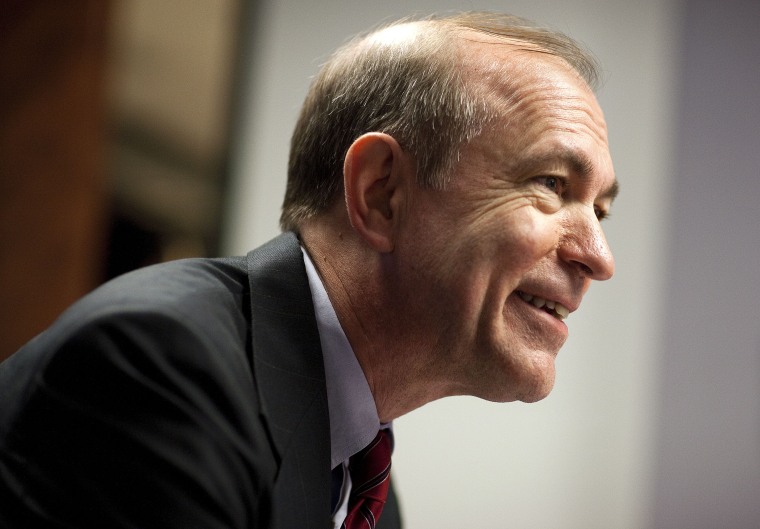Garrett's committee is vital to Wall Street. "The rules of the road for handling money and anything with the SEC go through this committee," says Marcus Stanley, policy director of the nonprofit Americans for Financial Reform. "There's a ton of money at stake." In Washington, the committee is known as the ATM, because banks and hedge funds shower the chairman with contributions. After the Dodd-Frank financial law forced hedge funds to register with the Securities and Exchange Commission, Garrett, already the recipient of more Wall Street money than almost any other member of the House, got millions more. The banks pay to have a voice, ensure they're at the table when new rules are discussed, and insinuate themselves into the chairman's good graces. Much of the money Garrett collects from Wall Street is supposed to be passed along in the form of party dues to the GOP's campaign arm, where it's used to help other candidates get elected. So the committee is also important to Republicans because it binds the party with the business community in a mutually profitable arrangement.
Key House Republican faces Wall Street revolt
One strategist recently said, "It's the biggest scandal nobody in Washington or Wall Street wants to talk about."

At first blush, it sounds like an incredibly boring title: chairman of the House Financial Services Committee's subcommittee on Capital Markets and Government-Sponsored Enterprises. For the typical person, it's a 14-word cure for insomnia.
But when it comes to money and politics, the person who enjoys that title -- Rep. Scott Garrett, a New Jersey Republican -- has created a situation unlike anything we've seen in a while.
Bloomberg Politics' Josh Green published a fascinating item last week capturing in great detail just how important the GOP lawmaker's job is, and just what a mess he's made.
When we talk about the ties between Wall Street and congressional Republicans, Garrett, a member of the notorious House Freedom Caucus, effectively serves as the connective tissue -- which, ordinarily, wouldn't be especially noteworthy, were it not for the fact that the congressman managed to throw a wrench into the machine.
Garrett's name may sound familiar to regular readers for two reasons. One, he was one of a small group of Republicans who refused to back John Boehner's re-election as Speaker. And two, Garrett reportedly announced last year that he wouldn't pay his dues to the National Republican Congressional Committee because the NRCC supported a couple of gay Republican candidates.
Or put another way, the New Jersey congressman believes his party just isn't anti-gay enough.
In general, no one would much care if a far-right lawmaker wants the GOP to be even further to the right, but many of the major players on Wall Street are quite progressive on LGBT issues, and a growing number of firms are reluctant to write checks to a right-wing congressman whose anti-gay views are so severe that he won't even offer financial support to his own party's campaign committee.
And so, Wall Street is pulling back its support for the one member of Congress the industry's major players are supposed to keep on speed dial. One strategist told Bloomberg Politics, "It's the biggest scandal nobody in Washington or Wall Street wants to talk about."
Garrett hasn't had much to say on the subject, until late Friday afternoon -- ahead of a holiday weekend -- when the New Jersey Republican issued a statement that he decided to leave off his official congressional website.
"I've tried to stay above the fray by ignoring these salacious hit pieces, but it's obvious that the Washington establishment is trying to distract from my work to revive the economy and hold the government accountable by portraying me as something I'm not," Garrett said. "My colleagues and my constituents know that I am a devout man of faith, and therefore I support traditional marriage. But calling me names or implying that I have malice in my heart for any person or group of people is false and completely disingenuous."
After complaining about Democrats for a few sentences, he added, "Like all Americans who exercise their right of free speech and religion, I make contributions to people and organizations who share my beliefs on important issues, in this case traditional marriage." At that point, the statement complained some more about Democrats.
Garrett did not specifically resolve the underlying controversy or comment on the fact that he's losing support from financial-industry allies.
Looking ahead, Garrett is facing a credible re-election challenge, and with many on Wall Street hedging, the incumbent's anti-gay attitudes may end up costing him his career. Josh Green's piece added this striking sentence. "When contacted by Bloomberg Businessweek to ask about their rationale for sticking with Garrett, U.S. Bancorp and Nomura both said they would cease donations."